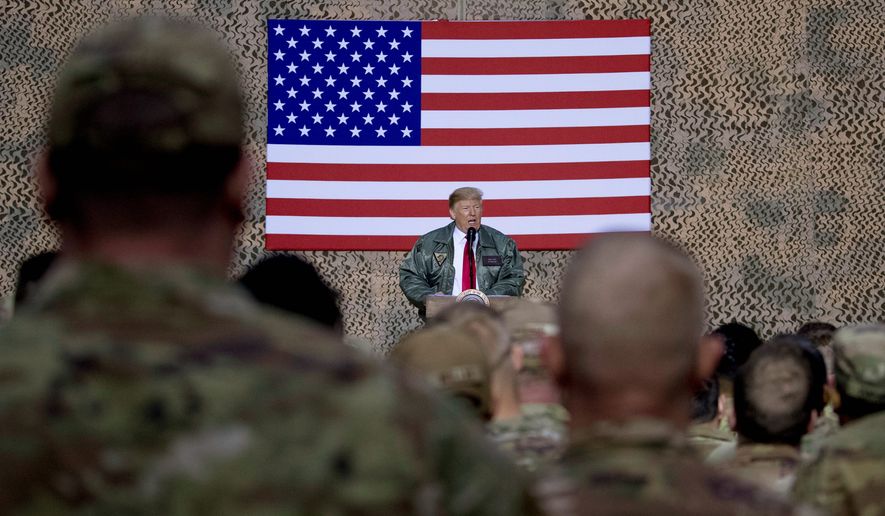The U.S. and Iraq opened talks Wednesday on a new agreement to allow U.S. forces to remain in the country, just days after Mr. Trump angered top officials in Baghdad by outlining plans to keep a military footprint in Iraq indefinitely to “watch” neighboring Iran and prevent a resurgence of terror groups such as Islamic State.
The negotiations come amid the meeting this week of the U.S.-organized “Global Coalition to Defeat Islamic State,” the 79-nation consortium spearheading the fight against the Islamic State.
The sensitivity of the troop deployment issue was underscored again Wednesday when Iraq’s most prominent cleric, Shiite Grand Ayatollah Ali al-Sistani, joined the country’s political leaders in rejecting Mr. Trump’s remarks.
Iraq “rejects being a launching pad for harming any other country,” the influential ayatollah said during a meeting with U.N. Iraq envoy Jeanine Hennis-Plasschaert at the cleric’s base in Najaf, the Associated Press reported.
President Trump visited the Al-Asad air base in western Iraq the day after Christmas and has cited the large American contingent deployed there as one key reason the U.S. can afford to pull out 2,000 troops battling Islamic State and other terror groups across the border in Syria. While the base hosts American troops and material, it belongs to Iraq.
“We spent a fortune on building this incredible base,” Mr. Trump said in the pre-Super Bowl interview Sunday that angered a wide range of Iraqi politicians. “We might as well keep it. And one of the reasons I want to keep it is because I want to be looking a little bit at Iran because Iran is a real problem.”
Iraqi government officials have pushed back hard on Mr. Trump’s comments. Many of the leading factions in the coalition government of Iraqi Prime Minister Adil Abdul-Mahdi favor closer ties to the regime in Tehran, and Iran remains a major trading partner and supplier of oil to Iraq despite stringent new U.S. sanctions.
“The U.S. is a major power … but do not pursue your own policy priorities, we live here,” Iraqi President Barham Salih on Monday.
A day later, Mr. Abdul-Mahdi at his weekly press conference, called on Mr. Trump to “retract” his remarks and said he also rejected the idea of Iraq becoming an arena for fighting a neighboring country. A draft bill is being circulated in the Iraqi parliament demanding the full withdrawal of the more than 5,000 American troops from the country.
But White House officials maintain the U.S. is “perfectly justified” in seeking a longer-term military presence in Iraq, as a bulwark against Tehran’s regional ambitions, an administration official said, speaking on background about Wednesday Islamic State gathering.
Iran and its proxy forces in Iraq and across the Middle East have “not exactly been advertising examples of good government” through its actions in the region, the official noted.
Secretary of State Mike Pompeo said Wednesday the U.S. remained committed to the removal of all Iranian forces and paramilitary fighters from Syria and other regional hot spots.
“We ask that our coalition partners seriously and rapidly consider requests that will enable our efforts to continue” in Iraq and Syria, he said, adding “those requests are likely to come very soon.”
Currently, U.S. forces are stationed in Iraq under a limited bilateral agreement to battle Islamic State elements based in the country. American, Iraqi and Iranian-backed militia forces combined to drive Islamic State from its stronghold in Mosul in a particularly bloody campaign last fall, but U.S. military officials warn Islamic State remains a potent threat to the region.
• Carlo Muñoz can be reached at cmunoz@washingtontimes.com.




Please read our comment policy before commenting.